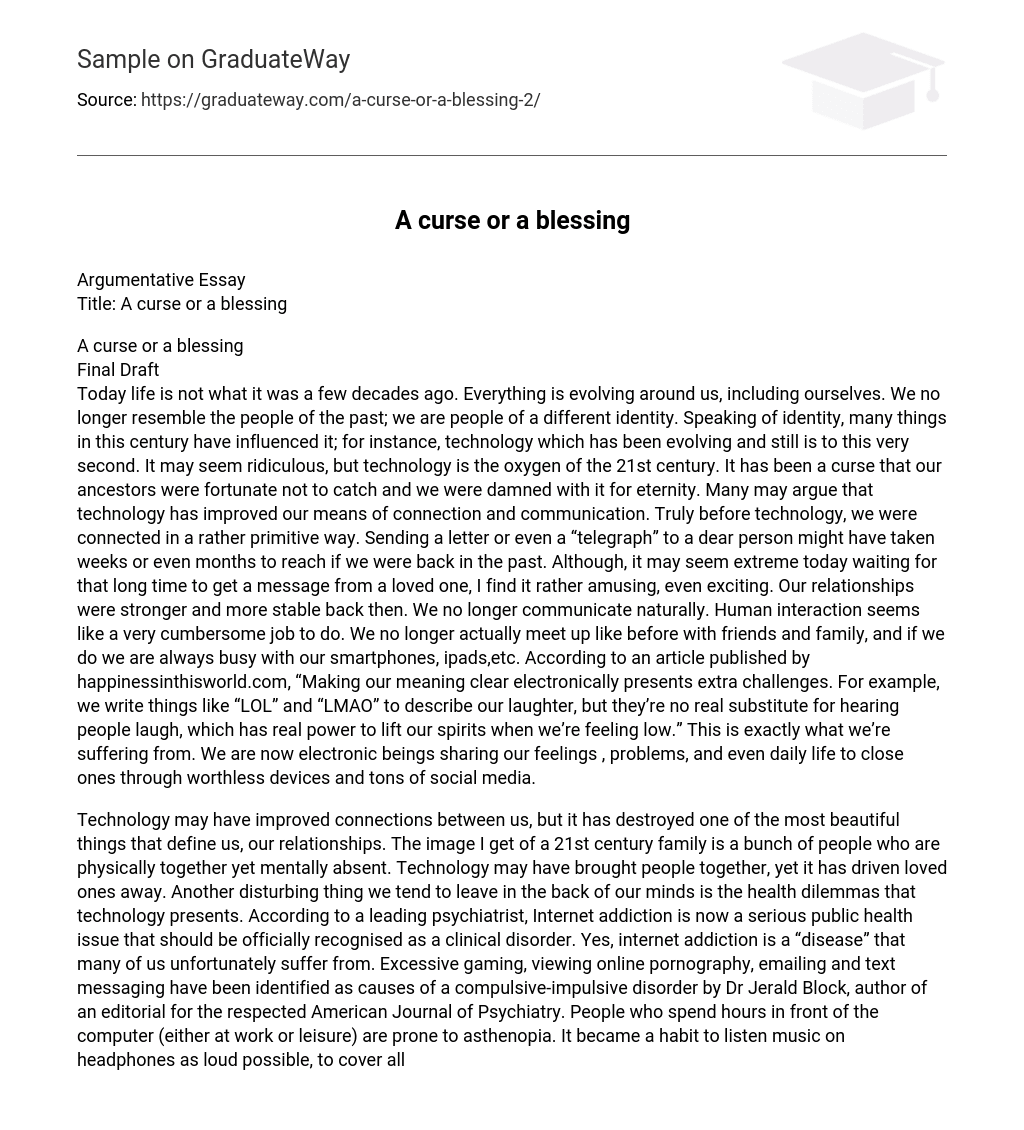Today, life has undergone a remarkable transformation compared to the past few decades. Both our environment and ourselves have evolved tremendously. We no longer bear resemblance to our ancestors; our identity has changed significantly. Various factors have contributed to shaping our identity in this century, with technology occupying a prominent position. Technology continues to progress and remains an indispensable element of our lives in the 21st century.
It might seem peculiar, but technology can be viewed as the driving force of this era. Our predecessors were fortunate not to confront the challenges it presents, while we are continuously burdened by them.
Many argue that technology has improved our means of connection and communication. In the past, staying connected was much more primitive; it could take weeks or months for a letter or telegraph to reach someone. While waiting that long for a message seems extreme today, I find it amusing and exciting. Relationships were stronger and more stable in the past, but now natural human interaction feels burdensome. We no longer meet up with friends and family as we used to, and even when we do, we are constantly preoccupied with our smartphones, iPads, etc.
Electronic communication presents distinct difficulties in accurately conveying emotions, as stated in an article on happinessinthisworld.com. Frequently, we rely on abbreviations such as “LOL” and “LMAO” to express laughter; however, they cannot truly substitute the uplifting impact of hearing someone laugh when we are feeling low. Regrettably, this is the predicament we currently face. As digital creatures, our dependence on devices and various social media platforms to communicate our emotions, issues, and daily experiences with loved ones often fails to establish authentic connections.
Despite its positive impact on connecting people, technology has negatively affected a fundamental aspect of human existence – relationships. In today’s world, families often find themselves physically present but emotionally distant due to excessive dependence on technology. Although it has fostered connections among individuals, technology has also contributed to the separation of loved ones. Moreover, the health issues associated with technology often go unnoticed. A well-known psychiatrist advocates for the official recognition of Internet addiction as a clinical disorder and acknowledges it as a significant public health concern. Regrettably, many of us suffer from this ailment known as internet addiction.
Dr Jerald Block, in a recent editorial for the American Journal of Psychiatry, has emphasized that excessive gaming, viewing online pornography, emailing, and text messaging can trigger a compulsive-impulsive disorder. Spending extended periods in front of a computer screen, whether for work or leisure activities, increases the likelihood of asthenopia. Nowadays, it is typical to use headphones at maximum volume to drown out external sounds while listening to music. However, engaging in these practices over time will result in gradual hearing loss.
The prolonged sitting that occurs in sedentary lifestyles can lead to a disease by obstructing blood flow to the legs and potentially causing blood clots in leg veins. Another issue of concern is Orthorexia, an extreme focus on consuming only healthy foods. The growing attention given to harmful chemicals in food has driven many individuals to become fixated on eating exclusively nutritious and environmentally-friendly meals. Consequently, more people are adopting strict diets that may have negative physical consequences. These examples demonstrate how technology affects our overall health!
With the advancement of technology, there is a widespread acceptance of its progress. However, it is worth contemplating the fast pace at which technology is advancing and the difficulties it presents for our minds. Whenever we acquire a new technological device, another more advanced one emerges somewhere else in the world. Furthermore, some people view technology as both addictive and trivial. Consequently, many individuals struggle with this addiction and find it challenging to live without technology even for a single day.
An intriguing image I stumbled upon on Facebook depicted the evolution of humans, highlighting how we are paradoxically reverting back to the primitive cave dwellers we once were, all due to technology. Life often teaches us the profound lesson that perfection is elusive – unfortunately, we cannot have everything. Technology serves as a tangible embodiment of this concept! While it is undeniable that technology has positively transformed our lives in numerous ways, it has also brought forth certain repercussions. Surprisingly enough, I would prefer to exist in an era devoid of technology.





